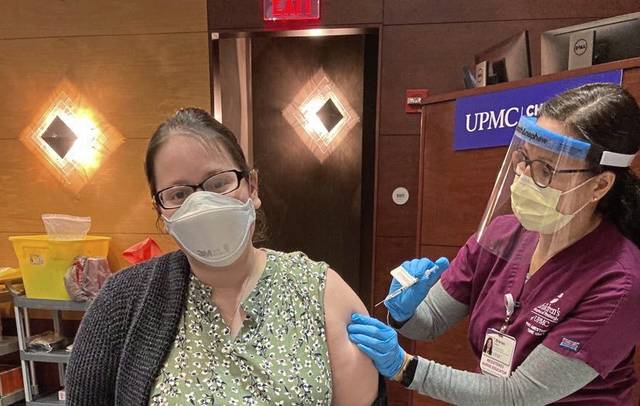Pittsburgh doctor wants pregnant women included in covid vaccine trials
Dr. Kacie Kidd is doing her best to protect her unborn child.
The 33-year-old mom-to-be decided to get the covid-19 Pfizer vaccine, despite lack of conclusive research concerning its safety for pregnant women.
Kidd, an adolescent medicine fellow at UPMC Children’s Hospital of Pittsburgh in Lawrenceville, is 26 weeks pregnant.
“I am looking out for my baby,” said Kidd, of Shadyside. “It was an easy decision. I know pregnant women weren’t included in the trials, but I do know that we have a higher risk of illness from covid-19 versus women who aren’t pregnant.”
So far, the Centers for Disease Control and Prevention recommends that pregnant and lactating women should decide for themselves whether to get the covid-19 vaccine. The Pennsylvania Department of Health has included pregnant women in its top priority category to get the vaccine.
Kidd said she had no major side effects from the two doses of the vaccine. She experienced soreness in her arm as well as warm feeling at the injection site.
As a health care professional, she believes vaccination is the best choice for her and her baby.
Still, she would like more specific data about the vaccine’s effect on pregnant women.
“I am thankful for all of the scientists who developed this vaccine,” she said. “But it would be great to have more information.”
Dr. Richard Beigi, president of UPMC Magee-Womens Hospital, and a group of medical experts published a paper in the medical journal Vaccine that calls for vaccine trials to include pregnant women, who have been historically excluded from such investigations.
The exclusion is “unjust and deeply problematic,” the Jan. 11 article said.
“We have this vaccine that is beneficial, and not harmful, but we need to have some data for when these products come out,” Beigi said. “Pregnant women should be included in these studies. I know this is not an easy decision, because there is fear of potential exposure. But we need a more thorough approach to protect them through research.”
Data suggests that pregnant patients with covid symptoms are at increased risk of more severe illness compared with non-pregnant peers, Beigi said.
Beigi said he is seeing pregnant health care professionals and breastfeeding moms opt for the vaccine.
Without information, “it’s tough to make an informed decision about what to do,” he said.
The lack of research about vaccines and pregnancy is similar to earlier needs for more research about women and heart disease, he said. For years, researchers focused on men to study heart attacks and strokes. When they began to study women, researchers found differing warning signs of heart attacks and strokes. Such information has been crucial in how women can prevent cardiovascular disease, he said.
Detailed information on vaccines helps a woman make an informed decision, Beigi said.
“Otherwise, we will continue to perpetuate a cycle whereby women are excluded from research, so there’s a lack of evidence, so they’re excluded from distribution, so there’s still no evidence,” he said.
The CDC has included pregnancy as a factor that leads to increased risk for severe covid-19. Black and Hispanic pregnant women have disproportionately higher rates of covid-19 infection and death, according to the CDC.
These disparities come from a range of social and structural factors, including socioeconomic status, access to care, rates of chronic conditions, occupational exposure, systemic racism and continued inequities in the health care system, according to the CDC.
“It’s not an easy decision because no one wants to be responsible for harming moms or babies,” Beigi said. “It’s challenging, but we can’t ignore it. None of this is aimed at criticizing the process. It is wonderful we have a covid-19 vaccine in 11 months that is safe. We just want some attention on this topic.”
JoAnne Klimovich Harrop is a TribLive reporter covering the region's diverse culinary scene and unique homes. She writes features about interesting people. The Edward R. Murrow award-winning journalist began her career as a sports reporter. She has been with the Trib for 26 years and is the author of "A Daughter's Promise." She can be reached at jharrop@triblive.com.
Remove the ads from your TribLIVE reading experience but still support the journalists who create the content with TribLIVE Ad-Free.

